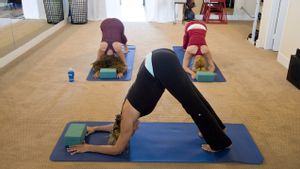JAKARTA - Sports provides many benefits to the body. Exercise regularly can help you feel stronger, healthy, and fit. Not only that, exercise can also help smooth your digestion.
In fact, sports have proven effective in treating constipation, according to a study in January 2019 in the Scandinavian Journal of Gastroenterology. It can even help relieve and manage symptoms of colon irritation syndrome (IBS), according to the Mayo Clinic.
If you're wondering what types of specific exercise can help smooth your digestion, see the following explanation citing the Livestrong page, Thursday, October 19.
"Because yoga involves some movements such as bending, folding, curling, stretching, and turning the body, it's no wonder yoga can provide great benefits to your digestion," said Kelly Clifton Turner, registered yoga teacher and education director at YogaSix.
"All these movements move your internal organs, including the stomach and intestines," Clifton said.
Clifton recommends three yoga movements, namely bubble pose, seed twist, and wind-releving pose. These movements can relax digestion and reduce gas trapped in the upper abdomen.
If you feel full after eating, walking short can speed up the work of the digestive organs, according to an innovative study in March 2008 from the Journal of Gastrointestinal and Liver Diseases. After comparing the effects ofiri, alcoholic beverages, and walking to digestion, the researchers found that walking reduces food transit time. While these drinks do not have the same effect as walking.
Another study in February 2022 at Sports Medicine, found that walking short after eating helps lower high blood sugar. Unsteady blood sugar levels due to diabetes can cause gastropiresis. A condition that makes foods stay in the stomach for too long and causes blood sugar to be very high or very low, according to the Gastrointestinal Society.
People living with digestive disorders such as IBS or constipation can also get help from moderate aerobic activity, such as walking, according to Patrick B. Wilson, PhD, RD, and assistant professor of human movement science at Old Dominion University.
VOIR éGALEMENT:
Apart from walking, you can consider running, said Carol Aguirre, RD, LDN, running coach and dietist. Running at moderate and stable speed will train the intestinal muscles so that it helps encourage bowel movements faster.
Like yoga, running can trigger a perictaltic movement. In addition to the physiological benefits of running, the drive produced by good jogging can encourage movement of the intestines.
"All body movements up and down can help the digestive system digest food more quickly," said Aguirre.
However, Aguirre warns that long-distance running and fast running with very high intensity can add to digestive disorders. So you should still do light running if you want to increase digestion.
The English, Chinese, Japanese, Arabic, and French versions are automatically generated by the AI. So there may still be inaccuracies in translating, please always see Indonesian as our main language. (system supported by DigitalSiber.id)


















